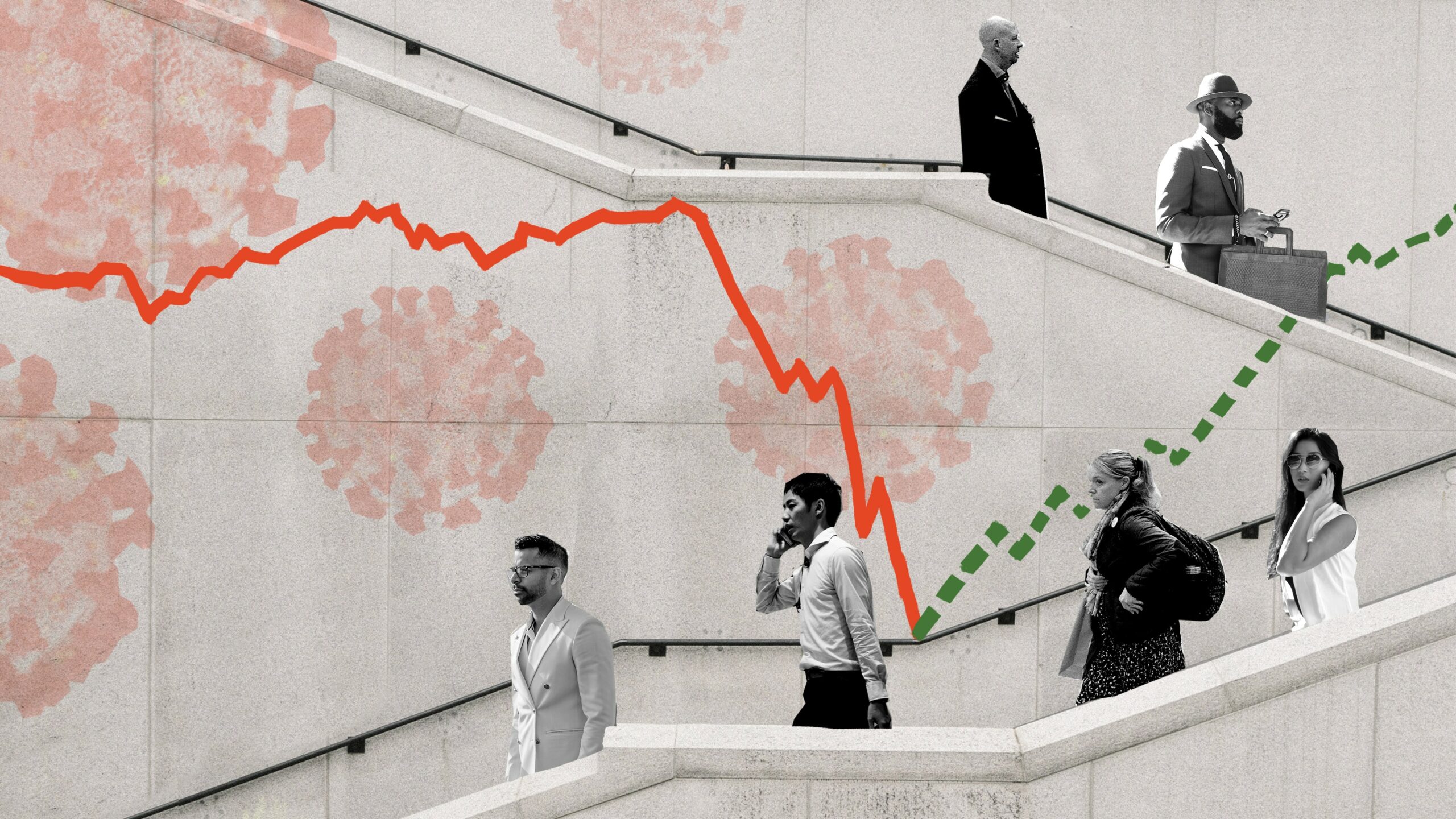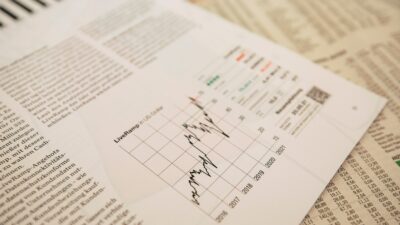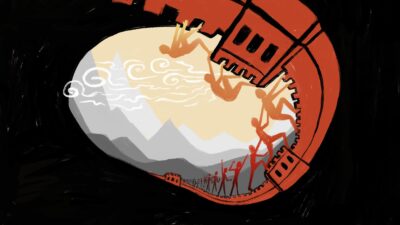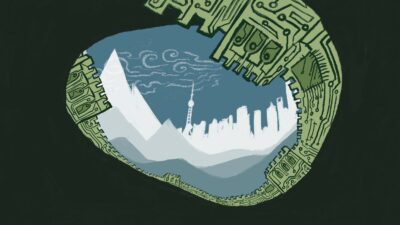Sandra Peter and Kai Riemer

The coronavirus (COVID-19) and economic impacts on The Future, This Week
This week: the coronavirus (COVID-19) crisis, and what it means for the future of business. Sandra Peter (Sydney Business Insights) and Kai Riemer (Digital Disruption Research Group) meet once a week to put their own spin on news that is impacting the future of business in The Future, This Week.
The stories this week
03:05 – How to think about the plummeting stock market
07:53 – How will the coronavirus shape the future?
Other stories we bring up
McKinsey executive briefing on COVID-19 and implications for business
‘Cancel Everything’ and social distancing
Cancelled events, conferences, festivals games and classes
Facebook tells employees to stay home and cancel any trips
Coronavirus will bankrupt SMEs
Sharp declines in the global oil price as a result of increased supply
Supply chain dependency on China
University of Sydney and NSW Health have grown the live coronavirus
Stanford University developed a new rapid diagnostic test for the novel coronavirus
How the coronavirus is slowing the work of scientists
Coronavirus is starting to slow the solar energy revolution
Why the coronavirus outbreak is bad news for climate change
Matthew Moore’s LinkedIn article on coronavirus and the digital workplace
Increased demand for conferencing tools
You can subscribe to this podcast on iTunes, Spotify, Soundcloud, Stitcher, Libsyn, YouTube or wherever you get your podcasts. You can follow us online on Flipboard, Twitter, or sbi.sydney.edu.au.
Our theme music was composed and played by Linsey Pollak.
Send us your news ideas to sbi@sydney.edu.au.
Dr Sandra Peter is the Director of Sydney Executive Plus and Associate Professor at the University of Sydney Business School. Her research and practice focuses on engaging with the future in productive ways, and the impact of emerging technologies on business and society.
Kai Riemer is Professor of Information Technology and Organisation, and Director of Sydney Executive Plus at the University of Sydney Business School. Kai's research interest is in Disruptive Technologies, Enterprise Social Media, Virtual Work, Collaborative Technologies and the Philosophy of Technology.
Share
We believe in open and honest access to knowledge. We use a Creative Commons Attribution NoDerivatives licence for our articles and podcasts, so you can republish them for free, online or in print.
Transcript
This transcript is the product of an artificial intelligence - human collaboration. Any mistakes are the human's fault. (Just saying. Accurately yours, AI)
Disclaimer We'd like to advise that the following programme may contain real news, occasional philosophy and ideas that may offend some listeners.
Intro This is The Future, This Week on Sydney Business Insights. I'm Sandra Peter, and I'm Kai Riemer. Every week we get together and look at the news of the week. We discuss technology, the future of business, the weird and the wonderful and things that change the world. Okay, let's start. Let's start!
Sandra Today on The Future, This Week: the coronavirus crisis, and what it means for the future of business. I'm Sandra Peter I'm the Director of Sydney Business Insights.
Kai I'm Kai Riemer, professor at the Business School and leader of the Digital Disruption Research Group. Okay. What are we talking about?
Sandra We need to talk about coronavirus (Covid-19).
Kai We mentioned it a couple of weeks ago and I think it's time.
Sandra But, we don't want to rehash the conversations that are in the news. You should be listening to the authorities as to health advice and everything from washing your hands to how the virus spreads.
Kai Also, I mean, this is a podcast, by the time people listen to this, this information would be outdated.
Sandra Yeah. To be clear, this is going out tomorrow. Nor do we want to talk about the way it currently plays out in business.
Kai You mean the toilet paper crisis of 2020?
Sandra I mean the bullshit crisis of 2020.
Kai So if you don't know for our international listeners, Australians have decided collectively that the best way to prepare for coronavirus is to buy enormous amount of toilet paper.
Sandra Nobody quite knows why, but there was profound hysteria in Australia around buying toilet paper, to the extent that you found a new term.
Kai Yeah, it's called 'panic-buyer's remorse'. And one of our largest supermarket chains, Woollies, has come out and said, look, if you bought too much toilet paper, tough luck, use it. You can't return it and get a refund.
Sandra Not only that, but tissues, serviettes, cleaning wipes, baby wipes, oil, rice. People have been stocking up like it's the end of the world.
Kai Yeah, you know, and you might say, well, that's great news for toilet paper manufacturers and all the rest of it. But it's really not because those people are doing overtime now. And at some point people realise, well, we have all this toilet paper, we don't have to buy anything for weeks and months. And then what do you do, right? So it really messes with supply chains.
Sandra But we are a business school and this is a podcast about the future. So we thought let's tackle one of the harder things, which is...
Kai How do you actually think about the implications of something that is so unprecedented and world changing that it's very hard to imagine what the world will be like after this event and how it will play out?
Sandra So we're gonna try to think through the future implications of coronavirus for business and society, and try to highlight a few aspects that you might not have thought about.
Kai And that comes with the caveat, of course, that we will have to revisit this as the world keeps changing around this. But we'll attempt an initial outlook for you. So, Sandra, what happened in the corona future this week?
Sandra I thought the first story we should tackle is one from the Atlantic that talks about the plummeting stock market. No one knows exactly what the impacts of coronavirus will be, but investors sure have a pessimistic outlook.
Kai And the other day, ABC News showed a chart of the plummeting Australian stock market.
Sandra And the business correspondents said that's not a chart. This is a chart and showed a chart of the American stock market that fell off a...
Kai Cliff, basically. And so this article raises the question, how do you actually price in or make predictions and forecasts about the future of the economy and the future of the stock market when what you're dealing with is unprecedented and hasn't happened before? In many ways, it's unlike previous epidemics or pandemics for this matter. It's happening in a hyper-connected world, not only in terms of transport, but also in terms of news and social media. So what do you do?
Sandra So this is where we want to start our thinking about the future with coronavirus conversation, in that the global stock market, theoretically, is the way that people think about what is happening with coronavirus and try to build that into what the economy will look like and then reflect that in the share price of various companies.
Kai Yeah. And just to remind listeners about the psychology of what happens in the stock market, obviously there will be direct economic problems from this corona crisis, which people are pricing in, that drives certain expectations about where the stock market will go, which reinforce itself. Everyone thinks it's going to be bad, which means it becomes even worse. But there's also the customer perceptions.
Sandra So let's make it clear this is not just about predicting how bad the impact will actually be, in terms of people not working or supply chains being disrupted, but it's also about how bad everybody else thinks it will be. Hence people restricting travel, entertainment, not spending as much at restaurants, not going out as much. So it's not just about reality, but it's about everybody's perception.
Kai And it's a self-reinforcing cycle because people see the stock market crashing, which means they have less money, which then drives the perception/expectations which reins in spending. So you get into this really pessimistic downward spiral, that might in the end not be a good predictor of what the actual impact of corona will be, but gives us an indication as to the panic and the unprecedented nature of what we're dealing with. So it's a real signal for how uncertain these times are when it comes to the future of business and how it's impacted by this pandemic.
Sandra And there was a nice quote in the article by Robert Shiller, who was a Nobel Prize-winning economist, was talking about the fact that if for the next 20 years, corona will only impact the economy for about three months, that is actually a very small impact to the market. But given that Wall Street has a memory of about 10 minutes, as the article says, it is very difficult to be sensible in the reactions that we have to the pandemic.
Kai So how then do we look at the implications for business from this? So one way of doing this would be to predict the extent of the pandemic, and the implications for the economy.
Sandra So really having a very big picture outlook on this and trying to figure out whether it's as big as the Black Death was back in the 14th century and really changing the entire landscape of the economy, or whether it's something that is a slightly lesser impact, something like SARS, which actually happened to have really positive economic effects as well, such as jumpstarting China's e-commerce sector and so on.
Kai So we'll put a link in the show, notes of a study by McKinsey, which is being updated on a weekly basis. And they have three scenarios, for example. The first one would be a quick recovery, the world reacts as decisive as China, the virus is seasonal, we get this under control quickly and it will hardly leave a blip in the economy. Or it leads to a global slowdown, there's countries struggling with the outbreak, but it will subside because the virus is seasonal, but it will have quite extensive implications for travel sectors, airlines, supply chains. Or, the third one, The worst case is we have a global pandemic, it's not seasonal, and it leads to a world recession, which has economic implications that are hardly predictable at this stage.
Sandra But we thought we would tackle this from a different angle. Although this is an unprecedented crisis, there are a number of business areas that we can look at to try to better understand what the future impacts of the coronavirus are.
Kai And so we found quite a number of articles that deal with implications for business from corona, and we will touch upon many of them and put them in the shownotes, but one that stood out, which we will take as our lead article is published in Axios.
Sandra And it tackles a number of areas to watch that we'll try to expand on and try to better understand and then complement with some additional ones.
Kai We will discuss the implications in basically five areas at this stage. The first one would be direct implications for travel and global supply chains.
Sandra The second one we'll tackle is...
Kai Implications for trade and national politics. The third one...
Sandra Remote work. And we'll tackle implications for research and science.
Kai And implications for our global response to climate change.
Sandra Let's start with travel and supply chains. That's probably the most direct, most visible implications of the novel coronavirus, and one that is already playing out.
Kai So the first one would be the implications for travel. So in Australia we have basically closed our borders for entries from countries that are majorly affected by corona. So that impacts airlines who are basically cancelling flights, reducing their capacity quite massively around the world.
Sandra We've seen in Australia our national carrier Qantas being hit really hard by these measures, and obviously as a flow on effect, all the businesses that depend on travel and that depend on proximity, on people being there to realise work, they've been affected as well.
Kai So in the wake of these travel bans, large business events have been cancelled. And the World Mobile Congress in Barcelona was probably one of the first ones which got cancelled because a lot of the participants from China, which is one of the major players in that industry couldn't actually come, which made the event unviable.
Sandra And we've seen similar decisions being made by Google and Facebook around their big conferences in the US.
Kai And then the picture shifted slightly. Now we see a lot of cancellations of large scale sporting events or cultural events such as concerts, to enforce social isolation just to, you know, have fewer occasions where the virus can actually spread. And quite significantly, the Coachella Festival has just been postponed...
Sandra To October. Last week we've seen to our sadness South by Southwest being cancelled. And something like South by Southwest, which attracts hundreds of thousands of people, has a huge impact on the economy of places like Austin, Texas, not only to the direct participation in this event, but also from flow-on effects to small businesses, to restaurants to transport in the area, accommodation and so on.
Kai And you know how bad things are when Italy cancels soccer matches, and they are now talking about not being able to finish the League. So there's a lot of direct implications in the areas of events and travel.
Sandra And this will continue to go on. We now have debates around potentially cancelling the Olympics.
Kai But these are the most obvious direct impacts on business. What we also want to highlight is what measures to halt the spread of the virus in China, for example, and Asia more generally does for global supply chains.
Sandra So far, the crisis has started to highlight how highly dependent on China many industries are, such as the carmaking industry, where you have just-in-time supply chains, which have all come to a grinding halt, for some industries slightly slower than for others, given that people were already stockpiling, given that Chinese New Year does put a halt on production in China.
Kai So that provided a bit of a buffer to global supply chains. But already in February, we saw the large Korean carmakers halt production because their production is very much tied in with just-in-time delivery of parts from China. So the moment those parts don't flow, they can't produce their cars, which basically puts production to a halt.
Sandra But whilst this crisis is quite visible in the case of large producers like car manufacturers, it's not so visible for smaller businesses that nonetheless rely on the same global supply chains and China as the ground zero for manufacturing.
Kai So there's an article in the independent UK which makes the argument why large businesses might be able to absorb this crisis to a certain extent, and for a certain time. It is smaller companies, startups that produce one product but are reliant on parts and materials from China, for example, or from other parts of the world, that are directly impacted, that have no income, that might not be able to sustain the crisis for any length of time, who might basically go bankrupt in the process. So a lot of small and medium-sized businesses at risk at this point.
Sandra So the thing to watch here will be what happens to small and medium businesses, but also whether or not, as the Axios article suggests, we will see a big decoupling with companies re-examining their supply chains and trying to be...
Kai Less dependent on international sourcing, on outsourcing. So there's talk about repatriating or building up local supply chains to reduce the vulnerability, to reduce the risk from global disruptions of supply chains.
Sandra But it's important to remember that whilst that might seem as...
Kai An easy fix.
Sandra We are facing what could become the perfect storm. On the one hand, the crisis does economically hamper millions and millions of people and businesses. But at the same time, we have a stock market crash, we have an oil war between Russia and OPEC, we have still actual conflicts happening and potential migrant crises and refugee crises. So this might be much more easily said than done under the current circumstances.
Kai So the dependence is real. Also, you don't change these things overnight. If you look at the car industry, you have models locked in for the next few years and contracts in place. So any such reconfiguration which, you know, let's remember with Trump's trade wars in some instances this talk has been going on for a while, especially in the US, to draw more on local suppliers. It's easier said than done, not just because of the complexity and the long term nature of contracts, but also because of price and cost structures and things like that.
Sandra So maybe this is where we should talk about the second area we should pay attention to in terms of trade and political implications. And there are a number of things to take into account here. And one is the potential for the rise of nationalism on the back of this.
Kai And this is both in terms of economics, so the extension of the trade war that Trump has initiated, and in terms of political nationalism, xenophobia, we're seeing a lot of calls in Europe for closing the borders, blaming foreigners for bringing in coronavirus, which is, you know, far from the truth because it's usually trade-related travel that brings the virus in and not refugees or unwanted immigrants, so that's obviously a populist argument. But we see a rise in this nationalism off the back of corona already. And that might actually strengthen. The New York Times had an article which we'll put in the shownotes, which is devoted just to that idea of a globalisation backlash that might be fuelled by coronavirus.
Sandra We also have direct trade tension and we've recently seen this play out in the price of oil where Saudi Arabia is the leader of the OPEC Group of Oil Exporting Nations proposed to cut the production of oil so that the price of oil doesn't fall off a cliff. It also invited Russia as another big exporter of oil to join them in controlling the supply so that the prices don't go down as quickly. Russia signalled that it would not do this. And as a consequence, Saudi Arabia reduced prices and decided to increase the oil production rather than cut it as initially proposed, which has led to a dramatic fall in the price of oil.
Kai And while you might say that that could be good news for people because it keeps their household costs down because the cost for petrol decreases, it has long term implications. For one, it washes out any oil production in the world that cannot compete on price with Saudi Arabia or Russia, most notably any oil production in the US, for example.
Sandra It also introduces an additional level of uncertainty into the market as companies try to price in the volatility that we're seeing in the oil prices. So even though oil prices might actually translate into lower fuel prices, lower energy prices for consumers, in the long run it is exacerbating the uncertainty. But there's one more dimension we want to add to the conversation around trade and political implications, which is the fact that the global conversation seems to have focussed on very large economies and the way they're affected. So we've seen China, we've seen Japan, the US, Italy being hit by this crisis. But there's less of a conversation of how smaller economies will be impacted very differently by the economic fallout from the coronavirus.
Kai So not only have smaller countries often less developed health systems, which might mean that their institutions and their economies are hit harder because the wave of infections might be more aggravated. These countries are also dependent on certain sectors such as tourism, for example, which is impacted by the travel, or they are export nations that have put their money into producing for other countries, they're now impacted by the disruption of the supply chains. And so we forget that we do still live in very unequal times, and our focus on the large economies might background how in the process smaller countries might be hit quite hard, especially when they're not capable of testing for the virus and curbing the spread.
Sandra So looking at how will the coronavirus shape the future of business? We've had a talk about travel and supply chains, we've also looked at trade and political implications. Let's have a look at remote work, because another way to think about how this is affecting business is to look at how it's prompting more and more companies to resort to remote work.
Kai This is obviously driven by a) the need for some workers to self-isolate and therefore to connect with the office remotely, but also by the shutdown of entire office sites where companies in the US, for example, are urging all their people to work from home and use collaborative technologies such as Zoom, Microsoft Teams, Google Hangout, SLACK, but also Workplace by Facebook and other social media to stay in contact, to share documents, to work on documents and to talk to each other.
Sandra So this will obviously impact companies quite differently. We've seen Twitter and Facebook urging their employees to work from home. These are companies where employees would be quite familiar with both the technologies and what remote work means for their organisation. But other companies are now faced with having no other alternative than moving to remote work, where they're either not prepared, employees haven't been familiarised with these technologies, or where this might actually hamper the way the organisation works, so think about creative industries like advertising that have very long resisted the move to remote work, which has seemed to hamper creativity.
Kai That's true. So in some industries it might have a impact on productivity, but some have argued to never waste a good crisis. And shout out here to our DDRG member, Matt Moore, who wrote a LinkedIn piece that we were put in the shownotes. This is actually an opportunity to establish more digital workplaces and to really put some power behind digital transformation of work and, out of need, establish new ways of working that actually might, in the long run, benefit some organisations who might not have otherwise moved swiftly to these work practices.
Sandra And the interesting thing to watch out for in this space will be the longevity of these measures. How long will companies be forced to, or will choose to rely extensively or exclusively on remote work?
Kai But it is happening, that's for sure. There's an article in Vox just this week which points out that Microsoft, Google and Zoom are desperately trying to keep up with the strong demand for their work from home software, which is largely free, so Zoom, Teams, Google Hangouts. So these companies are basically scrambling to upgrade their server capacity because the call volume has really markedly increased.
Sandra Let's look at a fourth area, and that is research and science, because we're really seeing a split impact there. On the one hand, we've seen a swift response from the research and science community to the coronavirus outbreak here at the University of Sydney with growing live cultures of the virus in the lab, with places like Stanford developing a diagnostic test that works much faster than the current models. So a speeding up of research in certain areas. But at the same time, the research community as a whole is very likely to experience a slowdown.
Kai So we'll put another article in the show notes this one from the Scientific American, which is titled "How the Coronavirus is Hampering Science". And it largely talks about the relevance and role of conferences in science and research as gathering's, where people meet and exchange ideas which also serve the purpose for young scientists to build their networks, to look for jobs, to meet with senior academics, to participate in tutorials and workshops, to hone their skills in journal publishing.
Sandra And for many disciplines this is the place where new ideas, collaboration and scientific advances get presented.
Kai And while you might argue why not move this online? We'd say, yeah, sure, you can do remote presentations or put slides online or videos online, but you're missing out on all the face-to-face exchange, the skills aspects, the networking and the way in which ideas are often borne out of conversations and serendipity and the chance encounters of people who do not normally get to see each other and meet each other.
Sandra And speaking of research, we do have to talk about the fifth area, which is one of the least talked about and could be one of the most impacted areas from this crisis, which is the response that companies have to the climate crisis.
Kai Yeah, companies and society more broadly, I would argue. And this is a complicated argument because on the one hand we see a lot of very positive news where because of the slowdown of economic activity in China and other countries, there's less emissions. So targets might be easily met this year because we're shutting down entire economies.
Sandra And we're shutting down festivals, we had a episode which we'll put in the shownotes that spoke about the emissions from things like Oktoberfest, which...
Kai Generate enormous amounts of methane. So we see this on the upside. And we might also argue that because oil is now cheap, it lowers the incentive for new oil developments because they're not as profitable anymore. So it might actually slow down fossil fuel exploration.
Sandra And of course, if people don't travel and we've just seen news that the US is banning all travel from Europe, if people do not fly aeroplanes, if they do not board cruise ships, if they work from home, there's less travel, less emissions.
Kai And some people might argue that we get used to less travel after this crisis. I'm a little bit sceptical of this, but if it results in lasting behaviour changes, that might have an impact. If we localise and decouple supply chains, that might also reduce emissions. So you might argue that there's a lot of plus sides to this, but...
Sandra But, there is a very strong argument for why, looking at the future, the coronavirus outbreak can be terrible news for climate change and. Here's where we want to bring in an article from the MIT Tech Review in recent days that tries to think about what the coronavirus outbreak means for climate initiatives in the long term. Because even though we've seen all the potential positive effects, and the news covers them quite widely, emissions are very likely to rise again as soon as economies start to recover, especially with global oil prices being at historic lows. This will spur on production, but more than that, it very much threatens alternatives.
Kai So the article makes four different points and the first one goes straight to the impact that cheap oil has on the switch to alternatives, not only in means of production, but also threatening the adoption of electric vehicles. We've seen this in the plunging stock price of Tesla just this week. But more important than Tesla, which I think is somewhat insulated from this because it's a brand that has already completely committed to electric vehicles.
Sandra With cheap gas, electric vehicles will be even more expensive than they were before to the end consumers.
Kai And not only is there less incentive because of cheap oil to change means of production. The fact that companies are hit hard economically and the stock market is hit hard, the capital might not be readily available to actually go through these transformational changes that companies have to go through to become more carbon neutral. So that's a real worry.
Sandra So indeed, it becomes quite difficult to invest and secure financing for things like solar or wind or battery projects, or any projects that not only made more financial sense previously, but also that have spare capital that could be used for transformative projects.
Kai And the third point comes in here, which goes straight back to the supply chain issues, because many such technologies, wind turbines, solar panels, batteries depend on the international supply chains and supply and parts and materials from China. So that's an additional spanner in the works of the transformation to a carbon neutral economy.
Sandra And the last fear that the article highlights is a more general one in the climate response area. And we're seeing that play out in Australia right now. Once you have huge health concerns, once you have rising financial concerns, it becomes increasingly difficult to keep the public attention focussed on things like climate change. Whilst at the centre of our national conversations we used to have the bushfire crises, and the bigger climate crises at the centre of this, public attention has been diverted now to...
Kai Toilet paper. Well, basically, for all its disastrous consequences, the bushfires had put climate change and the climate response front and centre, and there was considerable public pressure on the government to actually make lasting policy changes. Now, attention has completely moved to corona and it remains to be seen whether we can actually recover that momentum to bring about changes in this country.
Sandra And it's not just the climate as a priority for people who go to vote, but as an economic priority, also as a activist priority. We've seen large movements and indeed large public gatherings around climate, all of which have now lost momentum. So there are really long-term dangers to the conversations we have around climate and to the response that governments and organisations have to the problem.
Kai So we've outlined five areas: travel and supply chain, trade and political implications, remote work, research and science, and our response to climate change. Where does that leave us?
Sandra This leaves us at a very early stage in figuring out what these implications really are. We're only a few months into this corona crisis, but there are indications that this could be one of these significant global events for this decade.
Kai So we don't know where this will land us in this country, but there is a suspicion that with shutdowns and self-isolation, it might give all of us a lot more time to listen to podcasts. So if you haven't done so already, tell your friends and colleagues about our podcasts or leave a rating and review on Apple podcasts or wherever you listen to us.
Sandra And that's all we have time for this week.
Kai See you soon.
Sandra On The Future...
Kai Next week.
Sandra This week?
Kai Yes. But next week.
Sandra On The Future, This week. Next week. Thanks for listening.
Kai Thanks for listening.
Outro This was The Future, This Week, made possible by the Sydney Business Insights team and members of the Digital Disruption Research Group. And every week right here with us, our sound editor Megan Wedge, who makes us sound good and keeps us honest. Our theme music was composed and played live on a set of garden hoses by Linsey Pollak. You can subscribe to this podcast on iTunes, Stitcher, Spotify, YouTube, SoundCloud or wherever you get your podcasts. You can follow us online on Flipboard, Twitter or sbi.sydney.edu.au. If you have any news that you want us to discuss, please send them to sbi@sydney.edu.au.
Close transcript







